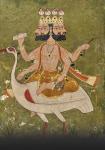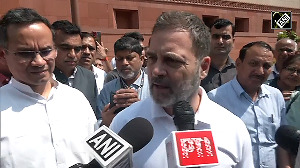'PM Modi would have swept the elections in Kashmir after notebandi, but then he scrapped Article 370 so all his good work went down the drain.'

Riyaz Ahmed, a meat shop owner, recalls the morning of November 9, 2016, when he saw his town of Sopore caught in a panic in the morning.
"Why are you recalling November 9, 2016, fondly if there was panic in Sopore?" I ask him.
"Notebandi," he says, and laughs out loud.
"Prime Minister Narendra Modi demonetised Rs 500 notes and from that day terrorism in this town, which used to be called as Chotta Pakistan of Kashmir, is almost over," says Ahmed.
Explaining his reasoning Ahmed says, "Digital India defeated terrorism. Every honest man in Sopore had queued up at the bank to deposit his notes but those who got money from Pakistan by ill-gotten means had to burn their cash."
"Funds dried up so terrorism died," he adds.
Sopore was once known as the apple town of Kashmir and many people also called it mini London before terrorism peaked in 1989.
Post 1989, the town was rechristened Chotta Pakistan in Kashmir as one of its prominent leaders, Syed Ali Shah Geelani, openly propagated the merger of Kashmir with Pakistan.
With Geelani's death on September 1, 2021, Sopore is trying to shed its terror image.
In the Lok Sabha elections earlier this year, its residents shocked political pundits as Sopore, part of the Baramulla parliamentary constituency, witnessed 44 percent voter turnout.
Asked who he was going to vote for this time, Ahmed says without a blink, "My vote is for Omar Abdullah's party, National Conference."
"PM Modi would have swept the elections in Kashmir after notebandi, but then he scrapped Article 370 so all his good work went down the drain," explains Ahmed. "We feel his intention was not to defeat terrorism but give our land to outsiders by abrogating Article 370."
Abdul Aziz Bhat, Ahmed's friend who helps him, joins in the conversation to say, "Thanks to notebandi, stone pelting is dead in Kashmir. You got to give credit to PM Modi for this but then he betrayed the Kashmiri people by abrogating Article 370."
"Twenty percent of the population of Sopore dominated over 80 percent of the population because they had illegal money which kept the stone pelting industry alive," says Bhat.
"We the 80 percent had to suffer silently, but now the terrorism days are gone because everyone is earning here in an honest way."
But there are still instances of terrorism cases in Kashmir, I interrupt Bhat. "Yes, there are, but there is a difference. You don't see local Kashmiris joining the terrorists. They are all outsiders from Pakistan who come here to spread terror," says Bhat.

Praising the Indian Army on how they are using digital media to discourage locals from taking to the gun, Bhat says, "Recently there were some locals in Baramulla who took up arms but then the army cornered them and killed them. They shot the entire operation via drone and circulated it on social media, discouraging other youth from joining the terror group."
"The army's strategy to use digital media to discourage Kashmiri youth from taking up arms is working," adds Ahmed.
At Duru, Geelani's native village, which falls under Sopore constituency, the late separatist is still revered.
There are no visible political party offices in the village and questions on elections are unwelcome.
"We don't vote for Indian agents," is the stern message I receive when I ask about the election mood.
Duru has witnessed zero vote percentage in many elections except the last time when some people did step out to vote.
The gates to Geelani's home are shut -- all his family members live in Srinagar now -- with only extended family members staying there.
Unlike security forces that are visible in Sopore town, there is none you see around Geelani's home.
There is the Najam Un-Sahar higher secondary school nearby where you see school buses entering and making an exit.
The distinctive feature of Duru and Sopore is that you see women in black burqas fully covered up which you don't find in other towns of Kashmir, which shows the continuing influence of Geelani's conservative Jamaat-e-Islami.
One also witnesses apple growers wbusy harvesting their crop and loading it on trucks.
When I asked a farmer how life in Sopore is post Geelani, he refuses to give his name and says, "Geelani was the messiah of our village. He protected us."
Who protects him now? His friend Rashid Bhat jumps in to quip, "Allah and Aadhar card."
He then shows the QR code on his Aadhar card and says, ";Thanks to this Aadhar card everyone knows where I stay and what I do. All of us keep it all the time for verification that we have nothing to do with militancy."











 © 2025
© 2025